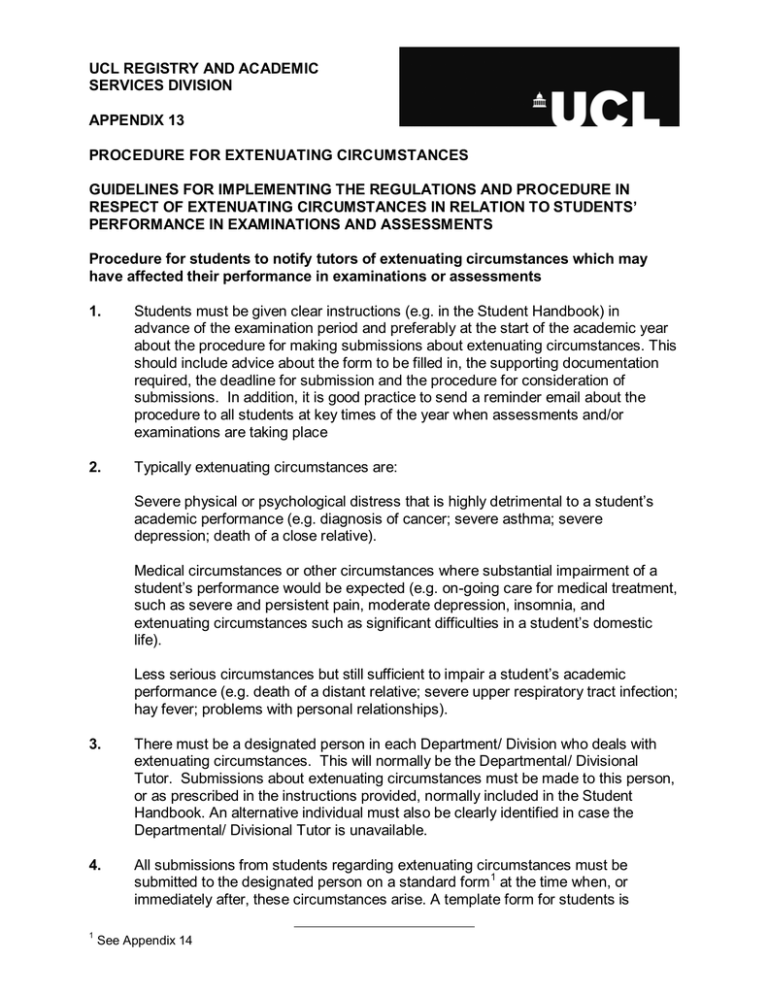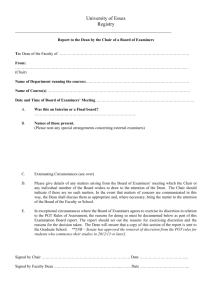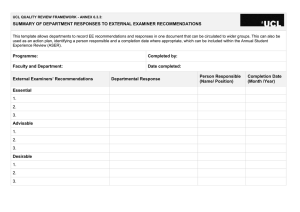UCL REGISTRY AND ACADEMIC SERVICES DIVISION APPENDIX 13
advertisement

UCL REGISTRY AND ACADEMIC SERVICES DIVISION APPENDIX 13 PROCEDURE FOR EXTENUATING CIRCUMSTANCES GUIDELINES FOR IMPLEMENTING THE REGULATIONS AND PROCEDURE IN RESPECT OF EXTENUATING CIRCUMSTANCES IN RELATION TO STUDENTS’ PERFORMANCE IN EXAMINATIONS AND ASSESSMENTS Procedure for students to notify tutors of extenuating circumstances which may have affected their performance in examinations or assessments 1. Students must be given clear instructions (e.g. in the Student Handbook) in advance of the examination period and preferably at the start of the academic year about the procedure for making submissions about extenuating circumstances. This should include advice about the form to be filled in, the supporting documentation required, the deadline for submission and the procedure for consideration of submissions. In addition, it is good practice to send a reminder email about the procedure to all students at key times of the year when assessments and/or examinations are taking place 2. Typically extenuating circumstances are: Severe physical or psychological distress that is highly detrimental to a student’s academic performance (e.g. diagnosis of cancer; severe asthma; severe depression; death of a close relative). Medical circumstances or other circumstances where substantial impairment of a student’s performance would be expected (e.g. on-going care for medical treatment, such as severe and persistent pain, moderate depression, insomnia, and extenuating circumstances such as significant difficulties in a student’s domestic life). Less serious circumstances but still sufficient to impair a student’s academic performance (e.g. death of a distant relative; severe upper respiratory tract infection; hay fever; problems with personal relationships). 3. There must be a designated person in each Department/ Division who deals with extenuating circumstances. This will normally be the Departmental/ Divisional Tutor. Submissions about extenuating circumstances must be made to this person, or as prescribed in the instructions provided, normally included in the Student Handbook. An alternative individual must also be clearly identified in case the Departmental/ Divisional Tutor is unavailable. 4. All submissions from students regarding extenuating circumstances must be submitted to the designated person on a standard form 1 at the time when, or immediately after, these circumstances arise. A template form for students is 1 See Appendix 14 provided here. The template form for students can be adapted by Departments/ Divisions with the permission of the Faculty Board of Examiners (electronic copies of the template form can be obtained from the Curricular Development and Examiners Section in the Registry and Academic Services Division, email examiners@ucl.ac.uk). 5. Cases must be supported by documentary evidence such as a medical certificate, doctor’s letter or other relevant evidence. Students should be given information about what to ask their doctor to provide, i.e. a statement of what is wrong together with the date and duration of the illness.2 Submission must be made either at the time of or as soon as possible after the incidence of the circumstances concerned, and, in any case, no later than seven days after the date of the assessment or examination affected. In very exceptional circumstances, a case can be made by the Board of Examiners to the Chair or Deputy Chair of the UCL Board of Examiners (UCLBE) to take into consideration medical and/or extenuating circumstances submitted after this deadline. 6. Although the primary responsibility for reporting extenuating circumstances lies with students, tutors may, if they think the information is relevant and they can provide a useful perspective on the effect of extenuating circumstances on a given student’s performance, also make submissions about their students if they think the information is relevant and they can provide a useful perspective on the effect of extenuating circumstances on a given student’s performance. However, tutors may not submit extenuation forms against the wishes of the student in question. A template form for staff is set out in Appendix 15. The template form for staff can be adapted by Departments/ Divisions with the permission of the Faculty Board of Examiners (electronic copies of the template form can be obtained from the Curricular Development and Examiners Section in the Registry and Academic Services Division, email (examiners@ucl.ac.uk). A generic form is also available to download from the regulations website (Appendix 15 http://www.ucl.ac.uk/ras/acd_regs). 7. This form should also be used to indicate information about any mitigation taken for an individual student as a result of extenuating circumstances, such as an extension to an essay deadline. 8. Information will also be submitted by the Examinations Section on events in examination halls that have affected an individual student or a number of students. These will be in the form of an email to the relevant Examinations Liaison Officer or Graduate Course Contact. 9. Information will also have been provided by the Examinations Section on students who have been granted special assessment arrangements to mitigate known medical circumstances. 10. Where the student is registered on a combined honours or joint degree, one of the Departments/Divisions will be specified as the home Department/ Division, which 2 Self-certification in this respect has been deemed unacceptable by UCL. If the Department/ Division is unsure about the nature and severity of any medical condition, the UCL Health Centre can offer generic advice but cannot discuss named individuals. will be responsible for grading the extenuating circumstances. Information on such grading will be transmitted to the Chair of the Board of the other Department/ Division and, where it exists, the Chair of an umbrella Board. The conduct of the pre-meeting 11. The UCL Regulations for Boards of Examiners prescribe that there shall be a premeeting before the main meeting of the Boards of Examiners concerned with progression or final awards to consider submissions received from students about circumstances which are likely to affect or to have affected their performance in examinations or assessments which they wish to have taken into account. 12. The pre-meeting operates with authority formally delegated from the Board of Examiners to which it reports. 13. The constitution of the pre-meeting must include the Chair of the Board of Examiners (and/or his/her deputy or an approved alternate), an appropriate Departmental/ Divisional Tutor and the Departmental/ Divisional Examinations Liaison Officer. There should be at least three people involved in the decisionmaking. There should be a member of staff allocated to take minutes of the meeting and the decisions made. The programme external examiner should not be invited to attend this meeting. 14. The extenuating circumstances meeting should take place sufficiently after the last assessment to allow students, staff and the Examinations Section time to submit information about extenuating circumstances, but also before the main Board of Examiners meeting in order to allow for further information to be sought, where appropriate, and the decisions made and recorded. It is suggested that this should normally be around a week before the meeting of the Board of Examiners. 15. The pre-meeting will consider all submissions in full and make recommendations to the Board of Examiners according to the tariff specified in paragraph 32 below. Those recommendations must identify the modules, examinations or assessments, including relevant PORTICO module codes, to which they relate. The Chair of the Board of Examiners will be responsible for communicating the recommendations of the pre-meeting to the Board of Examiners. 16. The pre-meeting should only consider submissions which are submitted on the standard form and are supported by appropriate documentation, wherever possible. 17. The pre-meeting’s consideration of cases will be carried out without knowledge of the marks for the courses concerned. 18. The pre-meeting and/or the Board of Examiners can seek advice and further information on medical conditions from the UCL Health Centre but not in relation to particular individuals. 19. The pre-meeting will then use its judgement to grade the extenuating circumstances according to a simple four-point scale that takes account of severity, duration and likely impact (see paragraph 32 below). The scale should be applied sensitively: it should be applied according to the likely effect of the circumstances cited upon the individual concerned. It is possible for circumstances which prima facie appear similar to lead to different grades. 20. The grades may relate to a single course assessment or to whole diet of courses depending on whether the problem has been acute, chronic or acute but with a lasting impact. Although the Board of Examiners will only use the grades in relation to some candidates where there is reasonable scope for compensation according to the circumstances and the marks achieved, grades must be decided for all candidates who submit extenuating circumstances forms since the pre-meeting will not be aware of the marks for the courses and candidates under consideration. 21. Extenuating circumstances should be considered for students of all years and a grade established in each year. These records should be reported to the Board and held over until the student’s final award is decided. The Extenuating Circumstances Pre-Meeting should review the grades given in each year for students who are being considered for a final award and ensure that all the information is available, and provide an overall review of them, if necessary. 22. The deliberations and recommendations of the pre-meeting should be minuted and given or transmitted to the Chair of the Board of Examiners, but only the recommendations will be disclosed to the Board. Information on these should also be transmitted to Chairs of joint or combined degrees, or of umbrella Boards, where these exist. 23. The recommendations should also be transmitted to the Chairs of Faculty Boards of Examiners accompanied by a collated summary of the recommendations at the same time as the Board of Examiners for overview and endorsement. 24. Chairs of Faculty Boards of Examiners maintain a log of the recommendations and the decisions taken in order to review practices and procedures and to ensure equity across the Faculty. A summary of the log will be submitted to UCLBE when the log has been maintained for a period of three years. Procedure at the meeting of the Board of Examiners 25. After the Board of Examiners has completed the academic assessment of the students’ marks it should consider extenuating circumstances. The Chair of the Board of Examiners will inform the Board of all the candidates who have submitted information about extenuating circumstances. He/she will present the tariff grades recommended by the pre-meeting, ensuring that the attention of the Board of Examiners is drawn, in particular, to those candidates who are borderline cases, both at Pass/Fail, for other classification purposes and for progression. 26. The Chair will not inform the Board of the detail of individual cases, but the Board has the right to request and be given such detail to inform any particular decision. The Chair shall have discretion, in exceptional circumstances, to decline to give detail of the circumstances of any individual case. 27. Where a final-year candidate successfully applied for extenuating circumstances and the outcome is to change the classification that he/she receives, the marks for the candidate must not be changed as it is undesirable to alter marks on nonacademic grounds. 28. In the case of an Honours classification for a final-year undergraduate or a Pass/Merit/Distinction 3 classification for a postgraduate degree, the marks must not be changed. 29. However, in the case of an undergraduate where Pass/Fail, progression or qualification for Honours is an issue, the marks can be altered to obtain the desired result.4 For instance, if a student has a mark of 38, but, on the grounds of extenuating circumstances the Board wishes to award a Pass grade, the mark must be altered to 40 (i.e. a Pass). 30. Similarly, in the case of postgraduate students at the Pass/Fail borderline, the mark must be raised to 50%. 31. Boards must be careful where concessions have already been granted to a student for an existing condition, e.g. the extension of a coursework deadline or extra time in an examination. Where such a student has been given an extenuating circumstances grade for a condition on the basis of which he/she has already been granted special treatment (for one or more courses) this should be brought to the Board’s attention so that double consideration is avoided. However, there may be cases where the special assessment arrangements only apply to an examination and where consideration may need to be given for other assessments such as coursework. The Pre-Meeting must ensure that it is clear when grading’s given to which assessment component(s) they apply. Guide to applying extenuating circumstances grades 32. The following grades should be used to indicate the severity of the extenuating circumstances and to inform the Board of Examiners as to how such circumstances might have impacted on a candidate’s performance and/or overall result. Only these grades should be used. There should not be any indication of grades between the ones specified below. 33. A – Severe physical or psychological distress that would be expected to be highly detrimental to a student’s academic performance (e.g. diagnosis of cancer; severe asthma; severe depression; death of a close relative). B – Medical circumstances or other circumstances where substantial impairment of a student’s performance would be expected (e.g. on-going care for medical treatment, such as severe and persistent pain, moderate depression, insomnia, and extenuating circumstances such as significant difficulties in a student’s domestic life). 3 Where these awards are available i.e. there is no Distinction classification for a Postgraduate Certificate and no Merit classification for a Postgraduate Diploma. 4 In cases where an accrediting professional body requires a specific pass mark on a course or courses to deem the candidate professionally competent, the Board may, at its discretion, make slight alterations to the mark appropriately. C – Less serious but still sufficient to impair a student’s academic performance (e.g. death of a distant relative; severe upper respiratory tract infection; hay fever; problems with personal relationships). X – Problems that are reasonably considered to be insignificant to the student’s academic performance, or where there has already been mitigation for the circumstances. Extenuating circumstances guidelines (revised December 2010)


